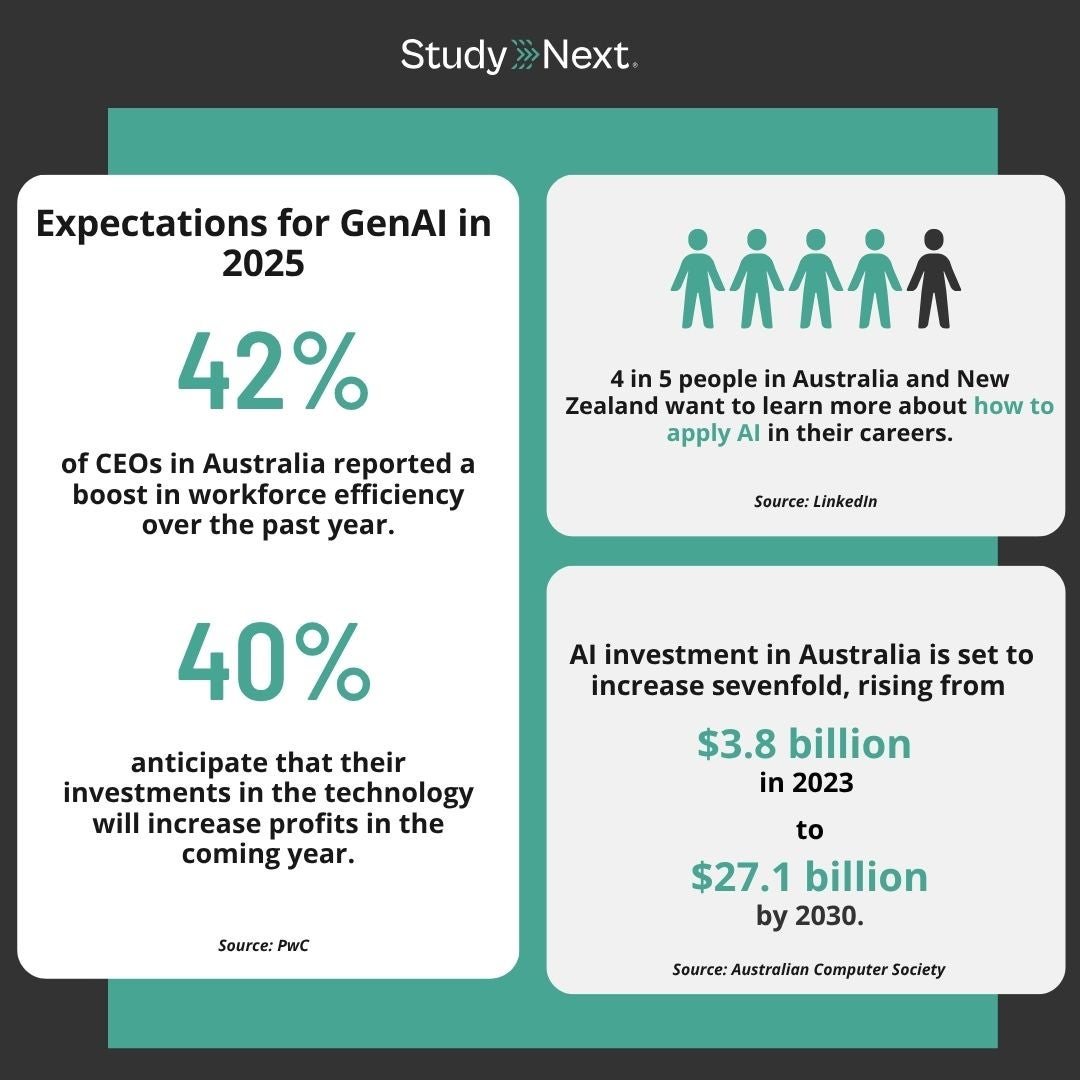
AI is widely regarded as the technology of the future, with many believing that being well-versed in it is essential to stay competitive in the job market. But how strong is the demand for AI skills in Australia and what specific abilities should business professionals focus on to build their AI expertise?
In this article, we dive into the evolving AI landscape in Australia, explore what AI skills are in demand and discuss how to develop the expertise needed to grow further in your career.
8 in-demand AI skills you should develop
AI skills cover both technical expertise and essential human skills that enable you to work alongside the technology. Developing these skills can help you leverage AI tools, systems and insights to make smarter business decisions.
AI literacy
Building AI literacy is the fundamental first step in mastering AI skills. It involves understanding how AI works, where it can be used and how to collaborate with it effectively. In Australia, AI literacy leads LinkedIn’s 2025 ranking of the fastest-growing skills that professionals need to develop to be competitive in today’s workforce, demonstrating its vital importance.
AI knowledge isn’t just for technical experts like data engineers but for professionals across various fields. Those who understand how to leverage AI can make data-driven decisions and get ahead of others. With AI literacy, you’re not just keeping up with this emerging technology, but also demonstrating your capabilities to thrive in the age of automation and innovation.
If you’re looking for a place to start, Queensland University of Technology (QUT) offers a beginner-friendly short course that breaks down the foundations of AI. You can gain an understanding of essential AI terminology, core concepts and applications as well as how this technology has evolved in the world of computing.


The Fundamentals of Artificial Intelligence course at QUT offers a comprehensive introduction to AI, making it accessible to learners from all backgrounds. Equip yourself with the tools to understand, engage with and responsibly apply AI professionally and personally. Embrace the future of technology with confidence and curiosity.
Key benefits:
- Learn on-demand: Access course materials online for 12 months and complete the modules whenever possible.
- Industry-relevant content: Gain practical knowledge and skills co-designed by industry experts.
- Career advancement: Enhance your professional profile with a Certificate of Participation upon completion.
- Flexible learning platform: Study seamlessly via Canvas, QUT's online platform.
- Quick access: Start your learning journey within one business day of enrollment.
Earn a Digital Badge of Completion
Participants who complete this program will receive a Digital Badge of Completion, a modern, verifiable credential that can be easily shared on LinkedIn, personal websites, email signatures and digital portfolios. This badge highlights your achievement and skills, providing a trusted and accessible way to showcase your expertise.
Machine learning (ML)
ML is a branch of AI focused on teaching machines to learn from data. By analysing past information, ML enables systems to perform tasks and make accurate predictions without being explicitly programmed. Some common examples include facial recognition in pictures, voice assistants like Apple’s Siri and product recommendations on e-commerce websites when you shop online.
Having skills in ML involves understanding, evaluating and applying ML outcomes effectively. It’s a skill set that combines analytical, technical and problem-solving capabilities to transform data into actionable insights. With these insights, you can shape organisational strategies and make data-driven business decisions with confidence.
The University of Queensland’s Applied Machine Learning short course can help you obtain a solid understanding of ML concepts and techniques, even without a technical background. You can learn how to work with multimodal data such as text, voice, audio and images. Even if you’re new to the field, this course offers a practical path to understanding ML and how it’s applied in the real world.


Harness the potential of machine learning (ML) to drive innovation and informed decision-making in your organisation. Specifically designed for non-technical professionals, this course simplifies complex ML concepts and equips you with the skills to evaluate and apply ML outcomes effectively.
From managing large datasets to working with text, audio or image data or collaborating with data experts, this program provides actionable insights to help you unlock ML’s value. Discover how to identify key opportunities, interpret results and leverage ML to gain a competitive edge in today’s data-driven world.
Programming
For business professionals looking to lead or support AI-driven projects, learning to program can be a smart investment. Even if your role doesn’t involve building AI models, understanding languages like Python, SQL or Java can help you connect and collaborate more effectively with data scientists and AI engineers. As AI becomes more integrated into various business tools, knowing how to code makes you more adaptable and ready to work with AI-powered applications.
Different programming tools serve different purposes, so gaining familiarity with a range of them can be a valuable asset. For example, SQL is great for writing queries to extract and manage data from databases, while Python is a versatile and widely used language for analysing, manipulating and making predictions from data. Mastering these tools allows you to tackle a variety of data and AI tasks effectively.
Learning programming doesn’t necessarily have to involve completing a traditional IT degree. You can find plenty of Australian institutions offering short courses to help you gain competence in programming, such as RMIT University’s Business Analytics with SQL and Python. In this course, you can learn how to apply basic SQL and Python functions to perform data modelling, make forecasts and execute classification tasks.


Business analytics is the process in which data is obtained, cleaned and presented by teams and organisations to drive useful predictions and insights. This course focuses on two ways businesses do this — SQL, where you will learn to write queries to extract data from a database and Python, the ubiquitous programming language that enables data analysis, manipulation and predictions.
With the opportunity to work on your own data set or with a data set provided, now’s the perfect time to roll up your sleeves and get hands-on with SQL and Python. Develop critical skills in wrangling, exploring, analysing and effectively communicating data to enhance your professional value and stand out in the competitive job market.
This course focuses on business analytics, teaching how to collect, clean and present data to generate valuable predictions and insights. The course covers SQL, enabling you to write queries to extract data from databases and Python, a versatile language for data analysis, manipulation and predictions. The course helps you develop key skills in data wrangling, analysis and communication, boosting your professional value and making you more competitive in the job market.
- Master SQL and Python for business analytics: Learn to extract, clean and analyse data using SQL queries and Python functions to generate powerful insights and predictions.
- Apply data analytics to real business problems: Work with real datasets, develop forecasting models and use data visualisation to support decision-making in a competitive business environment.
- Industry-ready flexible learning: Study 100% online, gain hands-on experience with structured query language and Python libraries and enhance your professional value with in-demand analytics skills.
Mathematics and statistics
Expertise in various mathematical concepts, such as algebra, calculus and matrices, help you understand how AI algorithms function. Probability and statistics also play a vital role in identifying patterns in data and making data-driven predictions. With strong math skills, you’ll be better equipped to build smarter AI solutions.
If you’re looking to develop your statistical skills for business purposes, you can consider enrolling in the Statistical Analysis for Decision-Making short course at CPA Australia. You can gain practical knowledge in data classification, probability, sampling methods and hypothesis testing to examine data and support organisational decision-making. Upon completion, you’ll obtain a recognised micro-credential from CPA Australia that can be added to your professional portfolio.


This course will teach you how to categorise and organise different types of data for analysis. You will learn about the fundamental concepts in probability and how they can be used in organisational decision-making.
You will also learn about various sampling strategies that can be used to infer conclusions about a population, calculating confidence intervals for determining the range of values in which a true population value is likely to be found, and hypothesis testing to explain why something has happened or predict what might happen in the future.
This course features examples and real-world applications provided by industry experts and financial leaders to embed the learning and bring the content to life. It will give you the requisite tools and techniques that are increasingly important in modern finance roles.
This highly interactive course, focusing on various industries, includes activities, videos and simulations to keep you engaged.
- Earn recognised credentials: Boost your career with a CPA Australia micro-credential and digital badge from Credly, showcasing your expertise in statistical analysis on LinkedIn, your CV or email signature.
- Develop advanced statistical skills: Master data classification, probability concepts, sampling techniques and hypothesis testing to analyse data effectively and drive organisational decision-making.
- Flexible, practical learning: Study online in a self-paced format with interactive activities, simulations and real-world examples designed for finance and accounting professionals.
About CPA Australia micro-credentials
CPA Australia’s micro-credentials are based on technical and non-technical competencies. CPA Australia’s partner, Credly, will provide you with a digital badge for successfully completing the assessment. Your digital badge demonstrates your capability and achievement and can be placed on your LinkedIn profile, digital CV or email signature.
Data analytics
According to SEEK, data analyst roles are predicted to grow by an impressive 23.2 per cent within the next five years, indicating a great demand for professionals who can analyse and interpret data to derive meaningful insights.
Having this skill is vital as AI systems heavily rely on data to learn, predict and generate outcomes. You need to have a strong ability to understand and work with data to be able to leverage AI tools effectively. This includes knowing how to collect, clean, identify patterns and draw meaningful conclusions from data.
There are plenty of courses that can boost your expertise in data analytics, such as the University of New South Wales (UNSW)’s Business Optimisation with Data Analytics. This short course teaches you how to use essential frameworks for applying data analytics effectively. You’ll also learn how to cultivate a data-driven culture within your organisation and understand how data can improve various everyday operations.


Staying competitive in today’s dynamic environment requires organisations to use, understand and rely on data. Unlocking data is the key to success, from streamlining processes to providing customer insights. In this environment, organisations must be able to develop and deploy effective data-driven strategies.
Implementing data strategy requires a systematic and organised approach to ensure consistency, clarity, scalability and efficiency. This course equips you with fundamental frameworks and practical strategies to accelerate your ability to make data-based decisions. You will also investigate the balance required to navigate ethical issues such as fairness, transparency, privacy and accountability. By broadening your understanding of data practices, you will ensure the successful and sustainable use of data that benefits all stakeholders.
After completing this course, you will emerge as a more informed leader, ready to leverage data analytics responsibly and bring greater value to your organisation and its customers. If you want to uncover the value of data, develop strategic skills, leverage data tools and explore ethical data practices, this course is for you.
- Delivered 100% online.
- Participate in live sessions facilitated by an industry expert.
- Receive a digital badge and 2.00 CEMD points.
AI ethics
While AI offers numerous advantages, it also comes with a set of risks. This technology can produce biased results and the data used to train AI models often raises privacy concerns. Having AI skills isn’t just about knowing how it works but also about having a deep understanding of how to use it ethically and responsibly.
Ethical usage of AI is also a national priority. Australia’s 8 AI Ethics Principles, developed by the federal government, provide a clear framework for creating AI systems that are safe and fair for all Australians. These principles guide both businesses and governments to uphold the highest ethical standards when designing and implementing AI.
As a result, business professionals with a strong grasp of AI ethics are highly sought after. This knowledge may involve identifying ethical risks in AI models and automation, protecting user data rights and addressing bias in AI algorithms and outcomes. With this expertise, you can help your organisation unlock AI’s potential while ensuring it serves the greater good.
The AI Ethics for Modern Professionals short course offered by CPA Australia explains the ethical challenges of AI technologies. You can learn how to use tools and techniques for building AI systems that align with ethical standards.


Artificial Intelligence (AI) in the workplace offers exciting new business opportunities, but it must be implemented responsibly and ethically. This interactive module explores the evolution of AI, how AI works and the associated ethical issues.
This course comprehensively explores the ethical considerations essential for the responsible development and deployment of artificial intelligence (AI) technologies. You will gain a deep understanding of the intersection between AI and ethics, focusing on the societal impacts, regulatory frameworks and practical strategies to ensure fairness, transparency and accountability in AI systems. Through a blend of theoretical insights and real-world case studies, this course will equip you with the knowledge and tools necessary to navigate the ethical challenges posed by AI in the workplace.
Featuring videos, examples and real-world applications provided by industry experts and financial leaders to embed the learning and bring the content to life, you will gain the tools and techniques increasingly important in modern finance roles.
Problem-solving
According to Indeed’s Skillfully Aligned report in 2024, both employers and employees rank critical thinking and problem-solving among the top five most important skills for the future of work. While AI does a great job of streamlining tasks and boosting operational efficiency, it can’t replace uniquely human skills. AI can process vast amounts of data, identify patterns and even suggest possible solutions. However, in order for AI outcomes to make sense, you need to have a sharp and analytical mind that can analyse problems from various angles and come up with the best way to address them.
AI can be used as a tool to support your decision-making process, but it can’t make the decisions for you. It’s up to you to interpret the data with your insight and judgement to achieve meaningful results.
Communication
Just below AI literacy, communication is ranked as the second fastest-growing skill in Australia, based on LinkedIn’s 2025 skills ranking. This highlights the importance of the soft skill, especially in an increasingly AI-driven work environment.
You’ll most likely be collaborating with people from cross-functional teams on AI-related projects, which may include data engineers, business analysts, developers and sales executives. Being a good communicator allows you to engage with stakeholders with and without technical backgrounds when explaining AI. Effective communication ensures everyone involved is aligned with business goals.
Demand for AI skills in Australia
The demand for AI skills in Australia has surged dramatically over the past decade. Based on Deloitte’s 2024 report, job postings requiring core AI expertise, such as machine learning, natural language processing and deep learning, jumped from just 300 in 2013 to nearly 6,000 in 2023. At the current pace of growth, this figure has likely grown since then. This trend aligns with findings from PricewaterhouseCoopers (PwC)’s 2025 report, which highlighted a similar leap. It revealed how there were only 2,000 job listings in Australia calling for AI skills in 2012, but by 2024, that number had skyrocketed to 23,000. These findings demonstrate that AI is an essential skill that’s becoming crucial across industries.
According to the 2024 report by the Tech Council of Australia, AI has the capability to create up to 200,000 new jobs in the country by 2030. However, to achieve this forecast, the AI workforce will need to see a 500 per cent growth between now and 2030. While the Australian Industry Group reports that 52 per cent of Australian businesses have already embraced AI technologies in 2024, that doesn’t necessarily mean they have the skilled workforce needed to fully leverage these tools. This highlights a great and urgent need for business professionals to upskill themselves by gaining AI expertise to fill the AI skill gap.
The state of AI in Australia: a data overview

AI beyond tech: how AI is revolutionising industries
AI is transforming industries by enhancing operational efficiency and boosting innovation. The Australian Government’s 2024 Emerging Roles report reveals that while AI skills were still heavily concentrated in IT and technical industries, they were also spreading beyond these fields. AI skills were reported in non-technical positions like project officers and sales representatives. This demonstrates a growing trend that AI is becoming crucial within a wide range of sectors.
Below are several ways AI is used in diverse sectors:
- AI helps personalise treatment plans by examining patient data to create care pathways according to individual needs and health conditions
- It can reduce the risk of burnout for healthcare professionals by automating routine administrative tasks, allowing them to focus on patient care
- AI may enhance diagnostic accuracy and preventive care by improving early detection of diseases like cancer
Finance
- AI can detect suspicious patterns in transactions that may indicate fraud
- ML models can predict cash flows and financial market trends, which can drive better investment decisions
- AI can produce personalised financial reports and identify opportunities to streamline financial reporting processes
Manufacturing
- AI systems can automate many routine and labour-intensive tasks, increasing operational efficiency and reducing labour costs
- Manufacturers can schedule maintenance effectively as AI can predict machine or equipment failures before they happen
- AI can examine historical sales patterns and market trends to forecast future demand, allowing manufacturers to balance supply and demand in their inventory management
Energy and resources
- Energy providers can reduce the risk of outages as AI can predict electricity demand
- Smart sensors in oil wells and pipelines can provide real-time updates on how they’re performing, including possible leaks or issues
- AI helps businesses identify climate risks and opportunities across their assets and supply chains, allowing them to make smarter investment decisions
Marketing and advertising
- AI can provide audience insights, helping businesses target their promotions more effectively
- By examining individual preferences, AI can create personalised marketing content that fits viewers’ interests
- AI can predict future customer actions, such as what products they’re likely to buy, based on their past behaviours
Human resources (HR)
- In recruitment and talent acquisition, AI can screen and shortlist candidates by examining their resumes based on how they align with job descriptions and keywords
- AI-powered chatbots can answer HR-related questions from employees and candidates, even outside of work hours
- AI can streamline many administrative tasks, such as scheduling meetings and setting reminders, allowing HR professionals to focus on people instead of paperwork
Government and public sector
- AI can find patterns and key causes behind issues like drug abuse and homelessness, which can help shape better policies and support disadvantaged groups
- Policymakers can use predictive models to forecast the outcome of proposed programs to determine their effectiveness
- AI can detect existing weaknesses in data security and information management within the public sector
AI is reshaping industries by helping to automate tasks, enhance decision-making and provide valuable insights. This calls for a higher demand for professionals with AI skills as organisations are not only seeking data scientists and engineers but also business professionals who can understand, apply and collaborate on AI-driven initiatives.
How to develop AI skills
You can develop AI skills by learning how to use AI tools, prioritising industry-specific applications of AI, taking AI courses and committing to continuous learning. Explore how they can enhance your skills in AI below:
1. Experiment with AI tools
You need to have hands-on experience to gain confidence in using AI. If you’re just getting started, you can explore user-friendly tools and software that integrate AI to boost productivity and efficiency, such as Canva, Grammarly and Notion. These platforms are designed to enhance your workflow while familiarising you with AI's practical applications.
Once you’re ready to take a step further, you can delve into more complex platforms. For example, Microsoft Azure AI offers developers and organisations a way to create innovative applications using prebuilt and customisable APIs and models. Some of their services include creating bots, detecting and identifying individuals and emotions within images, managing natural language processing tasks and more. Getting practical experience with AI software not only sharpens your skills but also opens your eyes to the endless possibilities that AI can offer.
2. Focus on industry-specific AI skills
While the core purpose of AI remains the same: improving operational efficiency, how it’s applied can vary across industries. If you're aiming to grow your career in a particular sector, you may want to specialise your AI skills to meet the unique needs of that industry.
For example, if you're in finance, you may want to learn how AI can detect fraud and optimise risk management. On the other hand, if you're in marketing, you can learn how to use AI tools and software that can predict customer behaviour, personalise user experiences and improve customer engagement.
3. Explore AI courses in Australia
Australian institutions provide a wide range of courses to help you sharpen your AI skills. Whether you're looking for a quick knowledge boost through AI short courses or aiming for a deeper, more comprehensive understanding with a master’s degree, you’ll be able to find a course that aligns with your learning goals.
These courses are designed to not only teach you how to work with AI tools, but also improve your critical thinking and problem-solving skills. You can learn how to break down complex problems, come up with solutions using AI techniques and make data-driven decisions. These skills are highly transferable and valuable across nearly all industries.
You can also study AI courses online if you need more flexibility, especially as a working professional. Many of these programs allow you to study at your own pace and access course materials anywhere, helping you to upskill while balancing your work and personal obligations.
Discover various AI-related courses below.


AI is reshaping organisations at an unprecedented pace. From automating routine tasks to powering groundbreaking innovations, AI is driving efficiency, improving decision-making and creating new opportunities. By increasing your AI literacy, you can be part of the digital transformation. Whether you are in marketing, finance or even operations, AI skills will empower you to make data-driven decisions, increase productivity and even drive innovation.
Throughout this course, you will discover how AI operates and how it can be best leveraged - from understanding generative AI and its limitations to mastering prompt engineering. You will gain practical insights and strategies for harnessing AI’s potential effectively and ethically at work and develop a practical action plan for implementing AI within your role. This requires leveraging a range of strategies for selecting and implementing the right AI tools for your role to stay ahead in the AI-driven world.
- Delivered 100% online.
- Participate in live sessions facilitated by an industry expert.
- Receive a digital badge and 2.00 CEMD points.


Using an innovative framework, you will learn to reimagine your business strategies through AI's disruptive innovation lens. By the end of the course, you will leave with a comprehensive strategic approach for leveraging AI's transformative power, ensuring competitive advantage, enhanced efficiency and sustainable growth.
You will learn about the origins and nature of AI and related exponential technologies shaping the contemporary commercial landscape, the opportunities, threats and responsibilities and how to harness these innovations' incalculable potential in the context of your industry and organisation.


VU's Graduate Certificate in Artificial Intelligence provides you with a solid foundation of AI technologies and skills for application development, including modern programming skills, data mining, data analytics, neural networks, deep learning and natural language processing.
World-class academics who are active in advanced AI research will provide you with examples of modern AI technologies and show you how they can be applied to provide innovative solutions to real-world problems. Guest lecturers from the AI industry will also discuss their experiences of the latest developments and applications of AI in industry.


The Graduate Certificate in Artificial Intelligence and Machine Learning, conducted through the University of Adelaide’s world-renowned Australian Institute of Machine Learning (AIML), will prepare you for an exciting career in this pivotal field.
This degree will equip you with a suite of technical skills in machine learning and AI application development, including in specialist areas, such as deep learning and visual question answering. You will gain broad awareness of the commercial, organisational and research opportunities presented by machine learning and AI. The degree offers an introductory understanding of the disciplines’ ethical and social considerations. You will also be equipped with the necessary foundation of skills and understanding to embark on work or further study in artificial intelligence or machine learning.


The graduate diploma artificial intelligence course provides IT and computing professionals with the opportunity to upskill and meet the demands of this rapidly changing field. The course covers a broad range of current and emerging areas of AI including data analytics, data visualization, machine learning and neural networks.This course also provides ideal preparation for graduates seeking careers in data analytics, AI/ML engineer and its related domains. Students in the course engage in practical and hands-on learning by using technologies to develop algorithms in various AI fields.
Choose this course to transition to the dynamic field of AI, where you'll develop a robust foundation in data analytics, visualisation and machine learning.


Equip yourself with the analytical skills needed to work with big data. This course combines information technology with mathematics and statistics with a computational focus.
The course is designed for information technology graduates and people working in information technology-related fields and provides the knowledge and skills IT professionals need to work with big data.


Many companies want to understand and harness this transformative technology in a world where artificial intelligence (AI) is reshaping industries. With Deakin’s Master of Applied Artificial Intelligence, you will acquire the specialised knowledge and skills essential for designing and developing software solutions that leverage the power of AI. Get ready to graduate as an in-demand professional worldwide.
Embrace the future of digital disruption and embark on a journey that immerses you in AI technologies, deep learning and reinforcement learning. Explore the application of these algorithms in computer vision and speech processing, paving the way for innovative solutions across diverse sectors. Experience practical learning that mirrors real-world scenarios, utilising state-of-the-art software, robotics, VR and cyber-physical systems in our fully equipped labs and studios.
As an AI specialist, you will collaborate with multidisciplinary teams, including software engineers, data scientists, application developers and business analysts, to ensure appropriate integration of AI into software solutions from a technical and human perspective. You will learn to apply advanced knowledge of AI to the research and evaluations of AI, while also exploring the complexities of introducing AI solutions in a human context, considering both ethical and engineering aspects.
Our world-leading research in AI feeds directly into our classrooms, meaning you will be learning at the cutting-edge of industry expectations and capabilities. Graduate with the hands-on experience to confidently work on designing, developing and operating AI-driven software solutions.
Artificial intelligence is driving digital disruption across almost every sector, redefining the workforce and creating global demand for skilled professionals. There will be more than 220,000 roles (25.3% growth or 44,700 new jobs) for software and applications programmers in Australia in the next 10 years.^ With this significant projected job growth, now is the time to future-proof your career. By enrolling in our Master of Applied Artificial Intelligence, you position yourself at the forefront of this thriving field, equipped to drive innovation and shape the future of technology.
This course focuses on developing skills in data science, data modelling and design, machine learning, numerical analysis, programming and software development.


The Master of Information Technology in Artificial Intelligence aims to prepare students for jobs in the growing artificial intelligence sector. The program will impart in students the relevant skills, both theoretical and practical. Students graduating from this program will be able to understand and explain to a diverse audience the fundamental principles underpinning AI and the limitations that AI has to operate under. They will also have direct practical experience in developing AI solutions for pertinent business problems and assessing the sustainability of such solutions. Given the far-reaching consequences of AI technologies, students will develop a demonstrable and adequate understanding and appreciation of its ethical, legal and other socioeconomic implications.
The Artificial Intelligence specialisation will provide you with the advanced knowledge and skills required for a successful career working with AI systems. You’ll critically examine emerging trends and topics like machine learning and natural language understanding. You’ll also consider ethical and legal questions about AI systems and learn about core AI techniques and the business context in which they operate. You’ll also have many opportunities to undertake practical hands-on experience developing and assessing AI solutions for business, including the option of an industry-based internship or supervised research project.
Prior experience in programming and statistics will be advantageous but not necessary for incoming students. Given AI's extensive implications in various aspects of modern society, the students will benefit from the expertise of Computer Scientists and have the opportunity to learn from experts in cognate disciplines such as Law, Philosophy and Business.
4. Practise lifelong learning
As AI continues to transform the business world, it’s crucial to stay ahead. Keep your skills sharp and knowledge updated by attending workshops and webinars, subscribing to insightful blogs and newsletters as well as completing AI upskilling courses. Joining online communities and forums can also help you connect with like-minded people and AI experts. By staying informed and continuously updating your skills, you’ll be equipped to leverage the full potential of AI in your career.
Future-proof your career with AI
In a rapidly evolving business landscape, you can get ahead by equipping yourself with the technical knowledge to thrive. Developing AI skills also gives you the strategic insights to drive innovation and make smarter decisions. Whether you're looking to upskill in your current role or pivot to a new career, mastering AI can unlock plenty of opportunities for professional growth. You can take the first step by checking out various AI courses offered by Australian providers.























